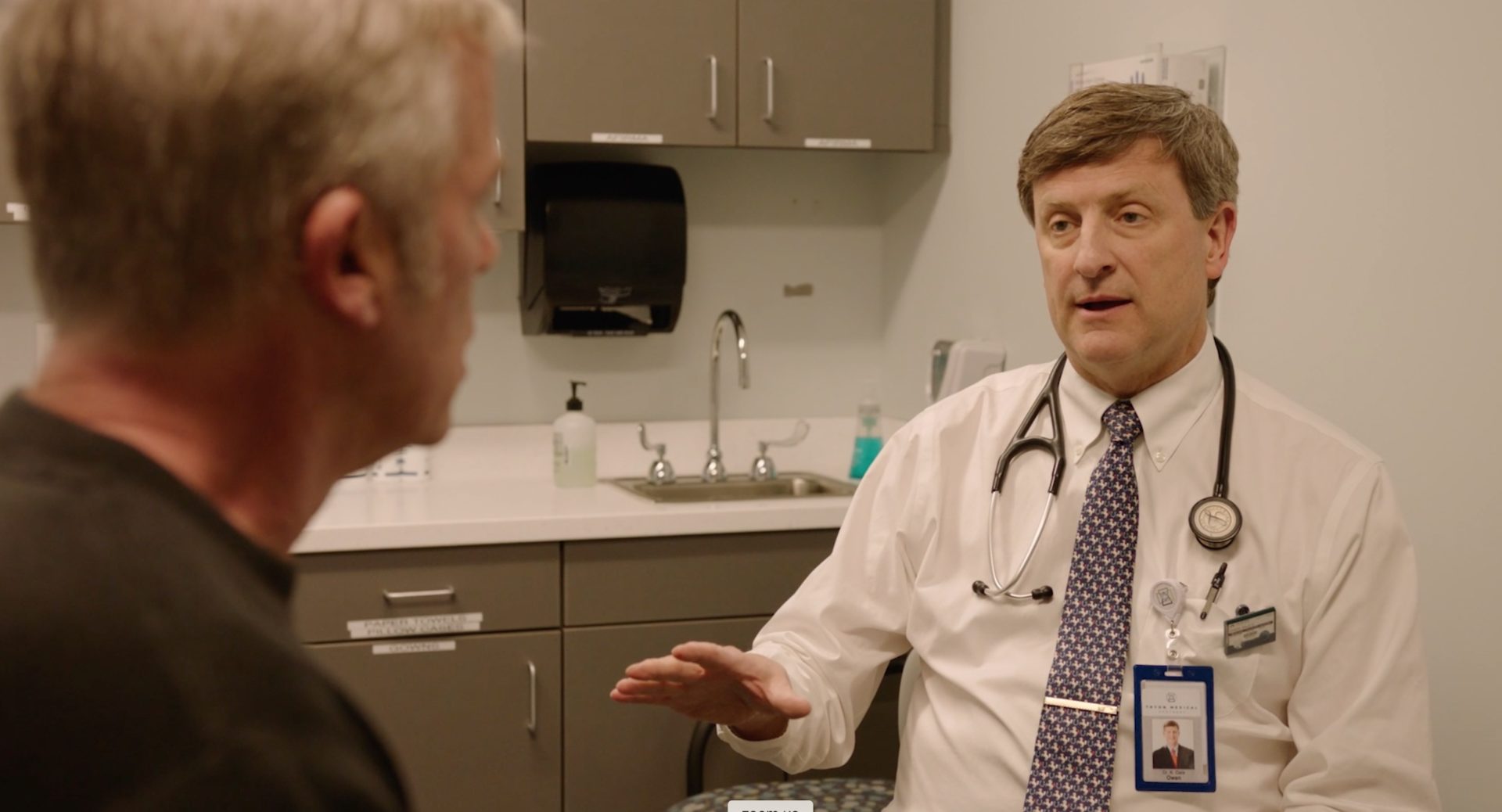
Congestive heart failure affects millions of Americans, yet the diagnosis often comes as a shock to patients who experience sudden breathing difficulties without understanding why. The term “failure” can feel frightening and final, but the reality is far more hopeful than many people realize. With proper understanding, treatment, and lifestyle management, many people with heart failure can live full, active lives.
Michael Tapia, a physician assistant and certified cardiology specialist at Tryon Medical Partners, has extensive experience treating heart failure patients throughout his career. Having worked in both rural hospital settings and specialized cardiology practices, he brings a compassionate, realistic perspective to helping patients understand their diagnosis and treatment options. His approach focuses on education, hope, and practical strategies for managing this common but serious condition.
What is congestive heart failure (CHF)?
Understanding the mechanics of heart failure helps patients move beyond fear toward effective management. Congestive heart failure occurs when the heart cannot pump blood effectively throughout the body, leading to a backup of fluid in various organs and tissues. This backup creates the swelling and breathing difficulties that patients commonly experience. The condition develops when the heart muscle becomes weak or stiff, reducing its ability to fill with blood or pump it out efficiently.
Despite the intimidating terminology, the condition is manageable for many patients. The word “failure” doesn’t mean the heart has stopped working entirely. Some clinicians, like PA-C Tapia, prefer terms like “cardiac deficiency” to better reflect that this is about reduced function rather than complete breakdown.
“I hate the word ‘failure’ because it can feel heavy and scary, like a death sentence. But that isn’t the whole story. It’s just the name. It means the heart is working less efficiently than it should. The heart isn’t failing and neither are you,” explains PA-C Tapia.
What causes heart failure? Is congestive heart failure hereditary?
Heart failure has many potential causes, ranging from lifestyle factors to genetic predisposition. The cardiovascular system can be compromised through various pathways:
- Coronary artery disease and heart attacks damage heart muscle by reducing blood flow.
- Uncontrolled high blood pressure forces the heart to work harder over time, eventually weakening it.
- Heart rhythm disorders can prevent efficient pumping.
- Diseased heart valves create additional strain on the cardiac system.
- Infections can temporarily damage heart function, sometimes leading to lasting effects.
- Substance use, particularly alcohol abuse and recreational drugs, can cause toxic cardiomyopathy—a form of heart muscle damage.
- Genetic factors can cause heart failure, even without any lifestyle risk factors or underlying health conditions.
- Age is an important risk factor, which increases the older we get. The condition can develop gradually over years or appear suddenly following an acute event like a heart attack.
“There are so many causes of CHF. I’ve even seen some young patients who live healthy lives and have never taken a drug before, but they’re genetically destined to have it. Often, it’s shocking for patients who get the diagnosis. They say, ‘I’ve never smoked, my blood pressure is good, I don’t have diabetes, and it creeps up on them,” notes PA-C Tapia.
What are the signs and symptoms of heart failure?
Recognizing heart failure symptoms early can lead to better treatment outcomes and quality of life. The big three symptoms are:
- Shortness of breath
- Being winded during day-to-day activities
- Swelling of your legs.
Some people may experience chest pain, which can present with CHF but is most commonly associated with rhythm issues or ischemic heart disease usually involving the coronary arteries (the blood vessels of the heart).
In his practice, PA-C Tapia frequently encounters patients who describe feeling like they are struggling to get enough air into their lungs: “People often come in and say: ‘I can’t breathe. It’s not chest pains, it’s not palpitations. It’s that I can’t breathe. I woke up and was scared for my life.’”
What are the four stages of congestive heart failure?
Heart failure progresses through distinct stages, each requiring a different management approach. The four stages of congestive heart failure represent a progression of the disease, from risk factors to severe, end-stage symptoms. They include:
Stage A: At Risk
Individuals in this stage have risk factors for developing heart failure, such as high blood pressure, diabetes, or a family history of heart disease, but do not yet show any signs or symptoms of heart failure.
Stage B: Pre-Heart Failure
This stage is characterized by structural heart disease, such as left ventricular dysfunction, but without any symptoms of heart failure.
Stage C: Symptomatic Heart Failure
Patients in this stage experience symptoms of heart failure, such as shortness of breath, fatigue, and swelling, which may be triggered by physical activity.
Stage D: Advanced Heart Failure
This is the most severe stage, where symptoms are present even at rest, and standard treatments may no longer be effective.
PA-C Tapia emphasizes the progressive nature of the condition and the importance of early intervention. The staging system helps healthcare clinicians determine appropriate treatments and helps patients understand the severity of their condition.
Can heart failure be reversed? What treatments are available?
Treatment approaches vary based on the underlying cause, and reversal is sometimes possible.
“The main thing we want to know is: What’s causing your symptoms? Blocked arteries? Can we open it up? Is it due to an acute infection that we need to monitor and see if we can reverse the symptoms? We need to know the cause before we can know what outcomes are possible,” explains PA-C Tapia.
Initial treatment for urgent cases of CHF focus on immediate relief: “When people are going through CHF, the first thing to do is get the fluid out so your system doesn’t get too overloaded. We provide supplemental oxygen and make you urinate out any excess fluid, which is important for ease of breathing,” PA-C Tapia shares.
I would add to the long term treatment lifestyle modifications which include monitoring you salt or sodium intake as that electrolyte correlates with water accumulation, placing compression socks or bands around the legs, monitoring your weight, oral diuretics or “water pills” and what we mentioned regarding the blood pressure to reduce the workload on the heart.
Long-term management involves reducing the heart’s workload: “Once we are past that acute phase, we try to reduce the workload on the heart to lower the blood pressure and open up the blood vessels so fluid can more easily come back through. That’s to help recover the heart as well,” PA-C Tapia explains. Long-term lifestyle modifications are also encouraged, including: monitoring salt intake and oral diuretics to prevent water accumulation, wearing compression socks or bands around the legs, and managing weight.
He shares an inspiring example: “I do like telling the story of a gentleman who came in with chest pain, he had a blocked artery, and his heart was struggling to pump. His heart was pumping at a fraction of what it used to do. Once we put in a stent (small, mesh-tube device, inserted into a blood vessel to keep it open) he felt he had a second chance, and within 12 months his cardiac performance had massively improved.”
What’s the difference between systolic vs. diastolic heart failure?
Understanding these distinctions helps patients better comprehend their specific condition.
- Systolic is when the bottom two chambers of the heart are squeezing
- Diastolic is when the bottom two chambers of the heart are relaxing, and filling up with blood
“Failure in those categories means one of them is improperly functioning: systolic has a hard time squeezing, leading to a heart that is open and floppy, or diastolic has a hard time relaxing to stretch and allow full blood flow in,” PA-C Tapia says.
How long can you live with heart failure? A message of hope
Perhaps the most important message for heart failure patients comes from PA-C Tapia’s philosophy of care and empowerment.
“If you have heart failure, your heart is still your heart. It’s just having a tougher time. Everything you do matters. Every step you take, every meal you make. Most people with mild to moderate heart failure can live full lives. You’re not defined by this. You’re defined by how you live, and to walk on the path of fearlessness, knowledge, resilience. The best thing is to focus on what you can do and what you want and feel is appropriate, and do your best. Listen to your doctors. They want you to be a success story, so help them help you.”
If you’re experiencing symptoms like persistent shortness of breath, leg swelling, or unusual fatigue, reach out to your primary care clinician for a referral to one of our cardiology specialists.

